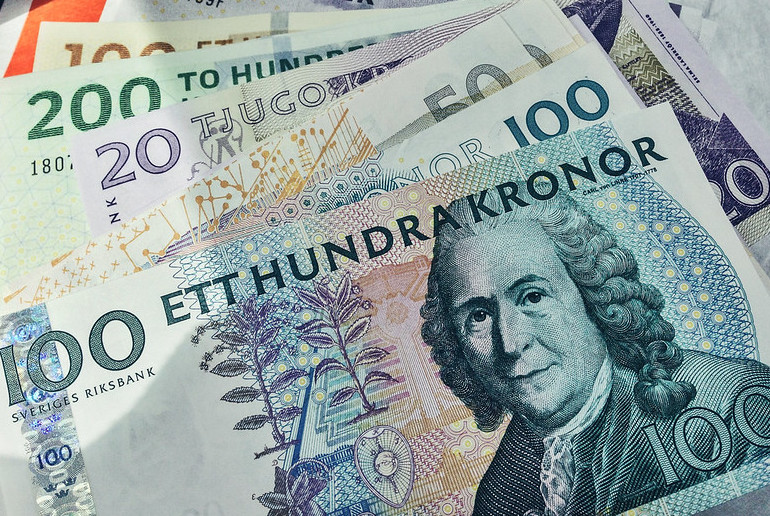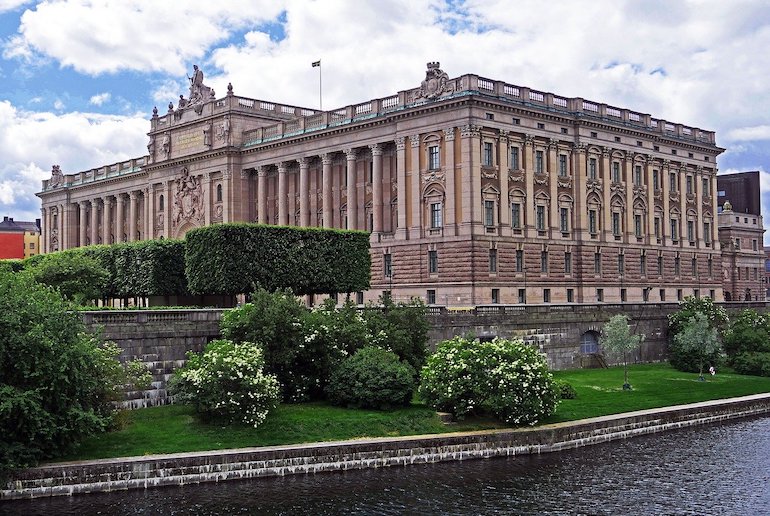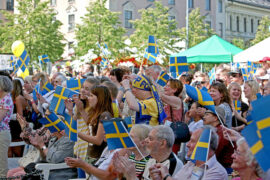Sweden and the other Scandinavian countries are often touted as successful socialist states. But, is Sweden really socialist? Or is this just a myth?

We look into the background of Sweden’s political make-up and underlying ideology and find out once and for all: is Sweden a socialist state?
Hot take: Is Sweden socialist?’
We need to look at a whole raft of issues when discussing this question, and here are three important points to consider.
- The current government of Sweden is centre-right, and espouses business-friendly policies.
- Sweden favours loose company regulation and has one of the world’s most competitive economies.
- Although personal income taxes are high, corporation and business taxes are low.
What is a socialist country?
So, first things first: what is a socialist country? Well, a true socialist country is one where everybody has an equal share of the society’s resources and economic output, and the community is valued more highly than the individual.
In successful socialist countries, healthcare, education and economic support are all provided free to every citizen, regardless of how much they earn. Sounds great, huh?

Well, yes in theory, but there are downsides: for example, it’s difficult for entrepreneurs to flourish in a socialist system, so some say that individuals may feel a lack of motivation to work hard.
Also, in socialist states, the government holds a huge amount of power over many aspects of an individual’s life – and that power, of course, is open to abuse.
The countries where socialism works best tend to have a hybrid system whereby socialism works hand in hand with capitalism.
These countries often have a capitalist free-market economy combined with a strong state-funded welfare system. So, is a Sweden socialist country?
Is Sweden capitalist or socialist?
Traditionally, Sweden’s wealth was built on a capitalist system.

Up until the 1960s, Sweden had a free market economy, low tax rates and relaxed regulations. And it became a pretty wealthy country under this system.
How long has Sweden been socialist?
So, when did Sweden become socialist? Well, during the 1960s, Sweden decided that, although it was a rich country, its wealth was held by a relatively small proportion of the population.
As a result, they introduced a number of measures aimed at redistributing some of this wealth to the poorer members of society.
Income tax was raised, so that the level of taxes that people paid was linked to what they earned.
And in return for paying higher taxes, welfare benefits, state education, healthcare and a raft of other social benefits became free for all.

In addition, in 1974 the constitution was changed so that the king no longer ruled the kingdom alone. The new constitution stated that “all public power in Sweden derives from the people” – a true socialist principle!
It’s true that the monarchy does still exist in Sweden today, but it has no political affiliation and no formal powers and is purely for ceremonial purposes.
Under these socialist principles, Sweden’s economy remained fairly stable until the late 1980s, when it began to suffer from low growth and high inflation and the krona had to be devalued several times.
This led to a financial crisis in the early 1990s, when two of the country’s banks were nationalised, and there was a sharp increase in unemployment, government spending and the national debt.
As a result, a series of market reforms were introduced in the mid-1990s, which moved the country in a more capitalist direction.
In 1996, the government introduced a limit on government spending (known as utgiftstak) plus a legal requirement for each budget to include savings targets, known as the “surplus goal” or överskottsmålet.
Since then Sweden’s national debt has remained lower than most of its Eurozone neighbours, and in 2019 a “debt anchor” (skuldankare) was introduced aiming to keep the country’s national debt at 35 percent of its GDP.
Compare this with the UK’s current national debt to GDP ratio – a mind-blowing 97 percent.
This fiscal policy has led to Sweden having one of the world’s most competitive economies, ranking 8th in the world in 2023.
What is the difference between socialism and democratic socialism?
Under a socialist system, the government has a high degree of control over all aspects of society and how the people live.
In democratic socialist countries, basic services are provided free to all residents, but the government is democratically voted in, and so the people have more influence over the bodies that run their services.
Is Sweden still socialist?
This is a question that has caused much debate amongst politicians and philosophers. Bernie Sanders famously singled out Sweden as one of the democratic socialist countries that he felt the US could learn from.
However, many commentators point out that Sweden is much more of a market economy, and that the regulations for companies are fairly loose.
Moreover, although personal income taxes are high, corporation taxes are relatively low, allowing businesses to thrive and contribute to the overall economy.
Why is Sweden no longer a socialist country?
Since the elections of 2022, Sweden has been governed by a coalition of centre-right parties, the Moderate Party, the Christian Democrats and the Liberal Party.

The prime minster is the Moderate Party’s Ulf Kristersson. However, it’s a minority coalition, so on some issues relies on support from the far-right Sweden Democrats, giving them direct influence over the government for the first time.
Therefore, in terms of its economy and general policies, Sweden can not really be considered socialist.
The country’s economy is very much based on low regulation for businesses, free market policies and capitalist principles.
And it’s government is controlled and influenced by right-wing, rather than socialist, parties.
Does Sweden have socialized healthcare?
It’s true that Sweden does have socialized medicine, which is an important aspect of a socialist country. Its healthcare is run by regional health bodies and funded by regional and local taxes.
The government also contributes to Sweden’s medical bill, spending about 11 percent of the country’s GDP on healthcare.
As with many of Sweden’s public services, the healthcare system is run by both the public and the private sector.
While much of Sweden’s healthcare is free overall, individuals have to contribute a fee for most services. Patient fees are set by each region and vary across the country.
Public health bodies pay private providers for some services, which are then free to the patient, or a fee is charged depending on the service and the region.
However, individuals can also chose to use paid-for private services, if they wish.
Dental care is free up to the age of 23, then subsidised after that.
What is the Nordic model?
Sweden, like most of the other Scandinavian countries, follows the Nordic model of government, also known as “cuddly capitalism”!
In reality this means that they are capitalist countries, but with strong publicly-funded services and good workers’ rights.
For example, Sweden has no minimum wage, so employers can pay their employees the market value for any job, which is typical of capitalist countries.
However, the country does have a strong system of powerful unions, so that workers are protected and supported in their jobs.
This may seem like a contradiction, but it seems to work in the Nordic countries, which have strong economies and good public welfare systems.
How does Sweden compare with other Nordic countries?
Sweden is not alone among Scandinavian countries in seeing a rise of the right-wing and adoption of more free market capitalist policies.
Issues of immigration play large in all the Nordic countries, and right-wing parties have garnered popular support throughout Scandinavia, and the rest of Europe, for their policies on this.
In neighbouring Finland, the 2023 elections saw the most right-wing government in recent times elected, possibly due to the impact of Russia’s expansionist policies.
Norway, however, has bucked the trend and elected a centre-left government, led by the Labor Party and supported by the Socialist Left Party.
Recent local elections there, however, show that the influence of right-wing parties is increasing, and more centrist policies are likely to be adopted.
And Denmark is currently ruled by a coalition of parties from both the left and right.
Led by Social Democratic leader Mette Frederiksen, the Danish government is made up of Liberals, Social Democrats and Moderates, breaking the traditional model of left and right for the first time in 40 years.
- Sweden. A centre-right government and right-leaning policies.
- Norway. A left-leaning government and centrist policies.
- Finland. A right-wing government and right-wing policies.
- Denmark. A centrist coalition and both left- and right-wing policies.
For more on the situation in these countries, see our guides to Is Norway socialist?, Is Finland socialist? and Is Denmark socialist?
Is this the end for Sweden’s socialist dream?
Despite popular perceptions, the truth is that Sweden has followed a mixture of socialist and capitalist policies for many years now.
It’s always been supportive of private enterprise and free trade, both central tenets of capitalism.
In 2020, the varnskatt, a 5 percent tax on those earning the highest incomes, was abolished, suggesting a lowering of the tax burden on wealthy individuals.
And the trend for tax cuts, and a corresponding reduction in the welfare state continues.
In 2022, however, taxes were still 41.4 per cent of Sweden’s GDP and the county still has a higher overall tax burden than average.
So in the future, in common with the other Nordic nations, Sweden is likely to be walking a tightrope between the idealism of a socialist state and the demands of a capitalist economy.
See also:
Sweden vs Norway: which one should you visit?
The best time to visit Sweden
The cost of living in Sweden










Socialism doesn’t mean “people don’t work hard”.
Anonymous is correct. I’ve read the Constitutions of several socialist governments and not a single one said their people are required to be lazy. On a similar note, who works Harder, the USA or Mexico? (Hint: I’d believed my fellow Gringos until I actually worked beside Mexicans and I was put to shame.) So I ask: Does Privilege mean people don’t work hard? My point, a form of government doesn’t necessarily mean anything about motivation, and I think Anonymous should agree with me.
yup but there is also a question of working hard and working efficiently, technically you are working harder if you work 12/7 like a friend of mine in America does but that results in her being tired and sluggish all the time but me for example that lives in Sweden that only work 7-8 hours 5 days a week, while I work less and its hard to compare this but I would bet I have a higher efficiency per worked hour then she has because I can fully rest between work hours for context why I’m o this page was… Read more »